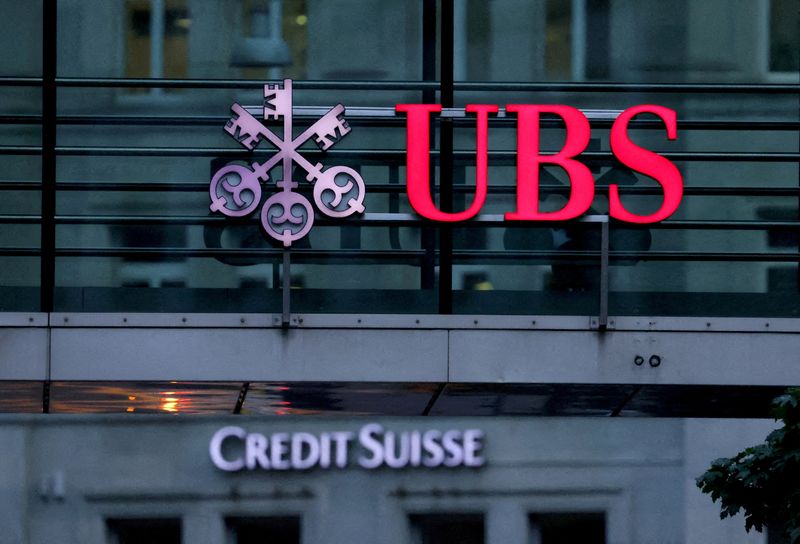By Huw Jones
LONDON (Reuters) -Global regulators defended Switzerland's move to back a rescue deal for Credit Suisse (SIX:CSGN) in March instead of liquidating it, in a report that exposed shortcomings of a regime established after the global financial crash to contain such a crisis.
The Financial Stability Board (FSB), an influential group of central bankers, regulators and officials from the globe's top economic powers, issued its report of "lessons to be learnt" on Tuesday, concluding the regime was overall a success.
The report, however, exposed tensions and conflicts at the heart of a process that ultimately required Switzerland to initially back the emergency rescue of Credit Suisse by rival UBS with public money to avert panic.
Switzerland's finance minister, Karin Keller-Sutter, said earlier this year she had little choice, given the potential economic fallout, and was not willing to see Switzerland experiment as the first country to close a global bank.
Nonetheless, the move contradicted a central tenet of post-crisis reform that taxpayers should not be called on to salvage troubled banks.
The report on Tuesday weighed why Swiss authorities had chosen to back a takeover by larger rival UBS instead of winding up, or liquidating, Credit Suisse under a "resolution" mechanism designed after the 2008 global financial crash.
The officials summed up that the "resolution" rules for shutting a collapsing bank without panicking markets could have worked for Credit Suisse, though public money would still likely have been needed.
"This review reaches the conclusion that recent events demonstrate the soundness of the international resolution framework in that it provided the Swiss authorities with an executable alternative to the solution that they deemed preferable," the FSB said.
Only enhancements to how the rules are applied might be needed, rather than changes to their substance, it said.
But while resolution or winding up the bank worked on paper, putting it into practice ultimately proved difficult, said a person with knowledge of the preparation leading up to the report.
"A globally active systemically important bank cannot simply be wound up," Switzerland's Keller-Sutter said earlier this year. "Legally, this would be possible. In practice, however, the economic damage would be considerable."
The regulators' report contrasts with a barrage of criticism earlier this year when UBS emerged as Switzerland's single largest bank after the government hastily arranged and partly bankrolled its takeover of Credit Suisse.
The FSB report sheds new light on events that led to Credit Suisse's downfall.
In the middle of 2022, Swiss regulator FINMA began crisis talks with international peers. The Swiss considered winding up the bank, nationalisation or a merger.
U.S. authorities cautioned against a liquidation, which would have hit bonds owned by U.S. investors, pointing to legal obstacles.
As newly appointed management grappled with the bank, they encountered "extreme episodes of liquidity stress" in the first half of October 2022, when panicked clients withdrew between 12 billion and 15 billion Swiss francs ($13.3-16.5 billion) daily.
The group recovered before ructions in the U.S. banking market triggered a share price drop and fresh withdrawals the following March, pushing it into the arms of UBS.
The report stops short of criticising Switzerland even though Bank of England Governor Andrew Bailey has said the Swiss did not follow the "playbook", creating "ambiguity" in markets about the credibility of resolution of big banks.
Arturo Bris, professor of finance at business school IMD, said the rules proved "totally useless" in practice as "they did not take into account the speed of reaction that is required in a banking crises."
The FSB said Switzerland's action preserved financial stability, even if it raised questions as to why the resolution was not chosen.
Bank consultant Mayra Rodriguez Valladares, founder of MRV Associates, said the resolution plans have never been used in a large failure. The only bank that used it was Spain's Banco Popular. "Those living wills are not public, but it seems to use them would take a long time and risk spreading panic in the system", she said.

"It certainly raises enormous questions about the reliability of the framework, that the regulators in charge of it don’t believe it can be used in times of stress," said Arthur Wilmarth, a professor emeritus at George Washington University Law School. "This notion the FSB says there’s nothing wrong, it’s still waiting there to be used, well wait a minute…this was the proving ground."
($1 = 0.9076 Swiss francs)